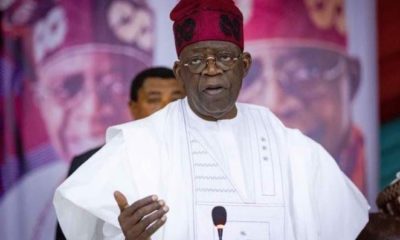Opinion/Feature
CSR in Nigeria: Shell’s intervention in community and economic development

Yemie ADEOYE
“Business has a responsibility beyond its basic responsibility to its shareholders; a responsibility to a broader constituency that includes its key stakeholders: customers, employee, NGOs, government – the people of the communities in which it operates.” – Courtney Pratt, Former CEO Toronto Hydro.
CORPORATE Social Responsibility or CSR as it’s always shortened is a phenomenon that can make or mar any operation or brand in whatever location on the globe. It is a most necessary factor for the sustainability of such operation or brand especially in the location or community that plays host to the brand and its operational service.
CSR is an essential part of most business module across the world, especially for brands that are corporately structured and very dependent on sustainability. This is so because the host countries and communities are a major factor in the survival of the brand and by extension its operations.
 In Nigeria, Africa’s largest economy and most populous country, the story of CSR is almost the same as it is world over, but took different dimension years ago and major international brands and operations came under intense criticism and attacks. But a deeper dive into the waters of community development and CSR activities shows a totally different scenario from what was portrayed by agitators at the time.
In Nigeria, Africa’s largest economy and most populous country, the story of CSR is almost the same as it is world over, but took different dimension years ago and major international brands and operations came under intense criticism and attacks. But a deeper dive into the waters of community development and CSR activities shows a totally different scenario from what was portrayed by agitators at the time.
The Anglo-Dutch giant Shell operates largely in Nigeria since 1937, when it started business as Shell D’Arcy, and has continued to build very strong bridges up to this day. Inspite of some of the negative news about lack of support through CSR, Shell has continued to empower people, communities and businesses across the West African nation with the commitment and focus of a brand that is very focused on sustainability and the future.
In 2019, Shell’s Nigerian businesses (SPDC, SNEPCo and SNG) made direct social investments of US$40 million in Nigeria, making the country the largest concentration of social investment spending in the Shell Group. These investments were recorded in Access to affordable healthcare, Supporting education, Enterprise support, Accelerating access to energy, Assistance and safety etc.
Shell and its subsidiaries in Nigeria have spent US$252 million on community driven programmes since 2006, with over 6000 university grants since 2011. This goes against the narrative that has always made the rounds about international oil companies’ lack of support for Nigeria, especially host communities.
Shell Companies in Nigeria have invested in healthcare and education initiatives in Nigeria for decades and has continued to support a range of programmes not just in the Niger-delta region where it operates, but also across Nigeria. This is achieved via a two-pronged social investment approach.
The first of such is tagged Direct social investment across Nigeria, which focuses on community and enterprise development, education, community health, access-to-energy, road safety and since 2018, biodiversity. The second is tagged Community-driven development programmes and initiatives in the Niger Delta, and this focuses on various themes as determined by benefiting communities and delivered through a Global Memorandum of Understanding (GMoU).
There are 39 active GMoUs in Abia, Bayelsa, Delta, Imo and Rivers States. In 2019,three new GMoUs were deployed and 10 GMOUs renewed. The GMoUs provide a secure five-year funding for communities to implement development projects of their choice. GMoU projects cover community health, education, enterprise development and social infrastructure, such as improved water and power supply, and sanitation. Since 2006, a total of $252 million has been disbursed to communities through these GMoUs.
TOP TEN INNOVATORS IN 2018
In 2018, Nigerian Yolo Bakumor Smith, CEO of De-Rabacon Plastics, won the first-ever Shell LiveWIRE Top Ten Innovators Awards for his business. De-Rabacon is a Nigeria-based plastic recycling and waste management solution company that recycles end-consumer plastics to viable commercial products such as pavement blocks, buckets, cans, and carpets.
“There is often a paper-thin line between success and failure in business, especially for a start-up. The training, support systems and valuable networks I have gained over the last five years courtesy of Shell LiveWIRE, have gone a long way to ensure that my business start-up, De-Rabacon Plastics is thriving,” he said.
“Shell’s approach to supporting local enterprises to grow and excel is enabling us to scale up our business and focus on designing eco-friendly, energy-efficient and affordable products. Today, my organisation employs 16 people and has recycled over 800,000 tonnes of plastic waste. We plan to achieve two million tonnes by the end of 2020.”
HEALTHCARE
The essence and importance of affordable but quality healthcare cannot be overemphasised, as it is a critical enabler to the development and sustenance any community.
It improves health indicators and outcomes and strengthens families, educational attainment and business opportunities.
 Shell has consistently supported community health programmes in Nigeria since the 1980s with equipment and pharmaceutical donations, emergency care and screening services, hospital maintenance and focused interventions on HIV/AIDS, malaria, cancer and vision care. Today, Shell seeks to increase access to health services, introduce health insurance schemes and strengthen health systems.
Shell has consistently supported community health programmes in Nigeria since the 1980s with equipment and pharmaceutical donations, emergency care and screening services, hospital maintenance and focused interventions on HIV/AIDS, malaria, cancer and vision care. Today, Shell seeks to increase access to health services, introduce health insurance schemes and strengthen health systems.
The Anglo-Dutch oil company continues to work with key stakeholders to achieve universal health coverage by increasing access to health and the uptake of services in the communities. The SPDC Joint Venture and SNEPCo supports 20 healthcare centers and signature intervention projects throughout Nigeria.
Health-In-Motion community care programme
Health-in-Motion (HIM) is a mobile health outreach programme that takes free medical services to where People live and work. Funded by the SPDC JV and SNEPCo, it reaches an average of 50 communities annually. In 2019, HIM services benefited 27,490 individuals in Imo, Bayelsa, Delta, Rivers and Ogun States. Since its launch in 2010, more than 667,000 people have benefited from this particular programme.
Community Health Insurance Scheme
The Community Health Insurance Scheme (CHIS) is a partnership between SPDC, Rivers State Government and local communities. The programme aims to provide affordable, quality healthcare to the people of Rivers State.
CHIS was launched in 2010 at Obio Cottage Hospital, a secondary health care centre, just a short walk from the SPDC JV offices in Port Harcourt. CHIS costs individuals $30 per year and covers about 95% of people’s health care needs. Since 2010, more than 67,000 people have been enrolled. In 2019, nearly 8,500 new clients registered.
The hospital has also seen an increase in the uptake of services. For example, the average number of patients using the facility increased from about 600 at inception to about 7,700 per month in 2019, making Obio one of the most utilised health facilities in the region.
This successful pilot has now been expanded to three other locations, highlighting the possibility for extended healthcare coverage in Nigeria.
Oloibiri Health Programme (OHP)
The Oloibiri Health Programme is a Shell-sponsored local government initiative in the Ogbia area of Bayelsa State. It is designed to improve health outcomes in an innovative and holistic way. The initiative included a full refurbishment of the Kolo General Hospital, which was inaugurated in July 2019.
More broadly, the initiative focuses on improving and maintaining health, not just treating illness. It strengthens local healthcare systems by upgrading and integrating facilities, training and supporting local healthcare and community workers and ensuring a reliable supply of medicines.
The programme has seen a five-fold increase in service utilisation to 4,210 patients in 2019 from an average 833 patients in 2017.
It has also provided training for over 130 health workers at community, local and state government levels. In addition to this, it has trained 117 volunteers as facility-based extension workers in house-to-house healthcare.
To anchor the sustainability of the OHP, the initiative aims to establish the Oloibiri Health Foundation that will institute the Ogbia Health Insurance Scheme akin to the scheme in place at the Obio Cottage Hospital.
The scheme will be launched with a one-time contribution from Shell and the Bayelsa State Government. The Oloibiri Health programme included a refurbishment of the kolo General Hospital, which was inaugurated in 2019.
EDUCATION
Over 35 percent of Nigeria’s population falls within the youth demographics. Providing easy access to education for this demographic is critical to the success of the country.
Shell Companies in Nigeria have a long history of supporting education through scholarships and other initiatives. Since the 1950s, the Shell scholarship schemes have supported several thousands of students many of whom are among Nigeria’s business, political and social leaders.
In 2019, the SPDC JV and SNEPCo invested $7.8 million in scholarships. Since 2011, the schemes have awarded more than 9,400 secondary school grants and over 6,000 university grants to students.
Cradle-to-Career Scholarships
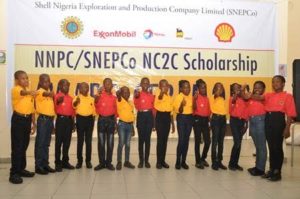 The SPDC JV and SNEPCo invest in the Cradle-to-Career scholarship programme, which pays for children from rural communities to attend some of the country’s top secondary schools. The SPDC JV has awarded a cumulative 600 Cradle-to-Career (c2c) scholarships in the Niger Delta. In 2014, SNEPCo began offering these scholarships to applicants across the country, and so far, 471 students have benefited.
The SPDC JV and SNEPCo invest in the Cradle-to-Career scholarship programme, which pays for children from rural communities to attend some of the country’s top secondary schools. The SPDC JV has awarded a cumulative 600 Cradle-to-Career (c2c) scholarships in the Niger Delta. In 2014, SNEPCo began offering these scholarships to applicants across the country, and so far, 471 students have benefited.
Since 2010, more than 1,000 students have received scholarships. The scholarships cover the full cost of tuition, travel, accommodation, uniforms, books and laptops. Students completing the c2c secondary school scheme also receive support from Shell through the University Scholarship scheme. This support is dependent on them securing admission to a Nigerian University.
Tertiary Education
Lack of world-class research institutions and limited access to technology are key challenges in enabling Nigerians to play an even greater role in the oil and gas sector. Shell invests in advancing education through university scholarships, student exchange programmes and focused research.
Since 2011, the SPDC JV and SNEPCo have awarded more than 6,000 university scholarships. As part of the drive to motivate students and reward the high performers in the University Scholarship Scheme, the highest-achieving students are then also given the opportunity to participate in the SPDC JV Students Industrial Work Experience (SIWE) programme.
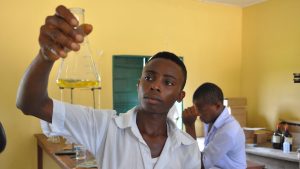 The SPDC JV also established the Shell Niger Delta Post Graduate scholarship programme which has benefitted 92 students from the region over the last decade. The programme offers one-year scholarships to three UK universities for studies related to the oil and gas industry.
The SPDC JV also established the Shell Niger Delta Post Graduate scholarship programme which has benefitted 92 students from the region over the last decade. The programme offers one-year scholarships to three UK universities for studies related to the oil and gas industry.
To promote the emergence of industry-ready graduates at university level, Shell also invests in specific initiatives at Nigerian universities.
The SPDC JV, in collaboration with the University of Benin, funds a Centre of Excellence (CoE) in Geosciences and Petroleum Engineering and has more recently (in 2017), collaborated with the Rivers State University to set up a CoE, which specialises in Marine and Offshore Engineering.
The CoEs offer specialised post-graduate degrees in Geosciences, Petroleum Engineering and Marine and Offshore Engineering respectively. Each programme lasts for 18 months and culminates in a six-month internship with an oil and gas company, some within Shell. By the end of 2019, over 75 students had graduated from the programmes and over 81percent of these graduates are currently employed.
ENTERPRISE SUPPORT
Shell works to improve the chances for Nigerians to achieve their ambitions. In addition to providing access to loans, and to small and medium businesses, which could become Shell suppliers and contractors, there is also the ‘LiveWIRE’ youth enterprise development programme.
 ‘LiveWIRE’ was launched in Nigeria in 2003 and provides training and finance to young people between the ages of 18-35 to start or expand their own businesses.
‘LiveWIRE’ was launched in Nigeria in 2003 and provides training and finance to young people between the ages of 18-35 to start or expand their own businesses.
In 2019, 140 people benefitted from the ‘Livewire’ programme, receiving training in enterprise development and management, as well as business start-up grants. More than 7,000 Nigerian youths have so far been trained under the programme and almost 4,000 young entrepreneurs were provided with business grants.
Two Nigerian enterprises were shortlisted in 2019 for the Shell Global Top Ten Innovators Awards, A global competition that highlights and rewards businesses that demonstrate excellence in innovation as well as giving entrepreneurs a chance to shine on a global platform.
The enterprises were FarmToJuice and Foods Nigeria Ltd “FarmToJuice” and Basiled Energy Ventures. FarmToJuice produces juices, processing any waste into livestock feed and using a biogas digester to provide energy. Basiled provides solar lamps, solar installation maintenance and repair and solar battery recycling services.
Shell “LiveWIRE”
Every year Shell ‘LiveWIRE’ supports thousands of individuals to access the knowledge, skills, networks and resources to turn their business ideas into successful enterprises, which provides sustainable income, create jobs and drive innovation.
The purpose of ‘LiveWIRE’ is to improve opportunities for young people to realise their potential through the creation and development of their own businesses.
Such businesses will contribute towards a more buoyant economy and communities with more fulfilled young people.
‘LiveWire’ in Ogoniland
In 2014,Shell extended the LiveWIRE initiative to Ogoniland despite the SPDC Joint Venture no longer producing oil and gas in the area.
The multinational oil company was only aimed at helping to raise the living standards and reduce crude oil theft in the area through the promotion of sustainable alternative livelihoods. This was in line with one of the recommendations of the 2011 United Nations Environment Programme (UNEP) Report for the restoration of the Ogoni environment.
In 2018, 100 Ogoni youths from communities near the Trans Niger Pipeline participated in training with 80 top performing trainees receiving business start-up funding amounting to more than $90,000.
In 2019, the Ogoniland programme gave way to a livelihood programme led and executed by the Hydrocarbon Pollution Remediation Project (HYPREP), an agency established by the federal government and to which the SPDC JV contributes funds. The programme will train 1,200 Ogoni women in various skills and is another initiative appreciated and fully supported and funded by Shell.
Assistance and Safety
These are two critical areas that the company has placed high emphasis. Shell Companies in Nigeria understands their responsibility when it comes to providing support for humanitarian and safety programmes, such as those providing relief to displaced persons or training for emergency workers.
Humanitarian Assistance
For many years, Shell has sustained a culture of care by supporting humanitarian programmes in Nigeria to save lives, especially during crisis and disaster.
In 2017, a contribution of more than $3 million to the Mercy Corps and Family Health International programme benefitted over 70,000 displaced persons in North-eastern Nigeria.
Then in 2018, SPDC provided relief materials worth $1 million to communities hit by floods in the Niger Delta and two other severely impacted states in the country.
Road safety and fire fighting
In 2019, SNG continued to demonstrate its 1 commitment to road safety in Nigeria by extending existing collaboration with the Federal Road Safety Corps in Ogun State to Rivers State. The campaign has held 26 road safety awareness events and reached more than 5,000 people since its launch in 2007.
SNG also held a one-day hydrocarbon training for fire fighters from Abia and Ogun States to further strengthen their capability.
Humanitarian Relief in the North East
Since 2018, SPDC and SNEPCo have committed $6 million to the government driven strategic intervention projects for Internally Displaced Persons (IDP) in Yobe and Borno States. The projects focus on immediate relief and critical support development related to health, water and sanitation, education and shelter.
By the end of 2019, the SPDC JV and SNEPCo completed the distribution of food, essential hygiene kits and other relief items to over 5,500 vulnerable households in IDP camps and impacted communities. SPDC also commenced project work on school reconstruction, and teacher training, upgrading of a Primary Health Care Centre and water and toilet facilities in Yobe State.
Access to Energy
Enterprise development, opportunities for education and access to affordable healthcare hinge upon being able to have reliable and cost-effective energy.
Shell aims to provide a reliable electricity supply to 100 million people, primarily in Africa and Asia by 2030. Nigeria features in that vision.
Despite its oil and gas resources, Nigeria has one of the highest levels of energy poverty in the world7. In addition to investing in Nigeria’s gas development and distribution network, Shell has established “All On” to boost off-grid supply to homes and small businesses in the Niger Delta.
All On, an impact investing company became operational in 2017 and is an independent Nigerian company that works with partners to increase access to commercial energy products and services. In December 2019, Shell made a significant additional long-term financing commitment to All On.
Off-Grid Energy
In an Interview with Dr. Wiebe Boer, a Yale alumni and CEO, All On he observed that Nigerians deserve more reliable energy, especially with its richly endowed location. “Positive change is coming. Already All On has invested in 21 off-grid energy companies and two funds, leading to 21,000 new connections for low-income households and businesses. The journey is just beginning”.
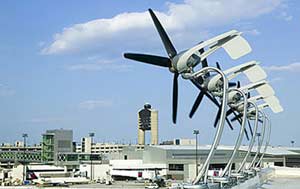 He stated further that the approach being deployed by his company is to get energy across to Nigerians. “Today, grid electricity can be unreliable and back-up generators are expensive and noisy. We help finance businesses that use emerging clean energy technologies to support the creation and growth of sustainable off-grid energy businesses for urban and rural customers.”
He stated further that the approach being deployed by his company is to get energy across to Nigerians. “Today, grid electricity can be unreliable and back-up generators are expensive and noisy. We help finance businesses that use emerging clean energy technologies to support the creation and growth of sustainable off-grid energy businesses for urban and rural customers.”
Affordable and available energy does change lives, and school children can do their homework, agriculture products can be processed and preserved, businesses can thrive, hospitals and schools can also function.
Inspite of these positive possibilities there still exists enormous but very surmountable challenges to the realisation of affordable and available energy.
“About 75% of Nigerian households and small businesses are either off-grid or have poor-grid connection. The scale of the energy access gap in Nigeria is a formidable and urgent problem. My challenge is how do I execute fast enough to make a significant impact without compromising on safety, quality, or anything else” he enthused.
All On invests in off-grid energy solutions spanning solar, wind, hydro, biomass and gas technologies that complements available grid power across Nigeria.
It also aims to help create a more enabling environment for start-ups and to provide them with low-cost financing. In 2019, All On executed an innovative financing instrument with Renewvia to provide affordable access-to-energy solutions.
Through this financing, at least eight mini-grids with a target capacity of 900kW will be installed in various communities. Working with Breakthrough Energy Ventures, Norfund and ElectriFi, All On also participated in the $9 million equity-financing round in Arnergy, which has enabled Arnergy to scale operations and provide solar energy systems for 1,500 small and medium-sized enterprises.
Conclusion
It is obvious from the above that while there continues to exist a massive infrastructural deficiency in the Niger-Delta and across Nigeria, Shell as an operational brand in Nigeria since 1937, and like any other responsible organisation, has been very involved in nation building through its consistent and far reaching Corporate Social Responsibilities, CSR, not just in the Niger-delta where it operates, but as far as the North-eastern region of the country, where it has zero operations.
For organisations and brands still considering and weighing the importance and place of CSR in their modus operandi, it is instructive that they take a cue from Shell by reading up on the CSR story of the Anglo-Dutch oil giant in Nigeria.
Opinion/Feature
Securing Edo State: Gov Okpebholo’s Unwavering Fight Against Crime

By Fred Itua
Crime is a fundamental threat to societal stability, and in Edo State, it has manifested in various troubling forms — ranging from kidnapping and cult-related violence to armed robbery and illegal land grabbing.
For years, criminal elements have terrorized communities, disrupted businesses, and put lives at risk. The inefficiency of past administrations allowed insecurity to fester, exemplified by incidents such as the kidnapping of Anthony Aziegbemi, chairman of the opposition Peoples Democratic Party (PDP), while the PDP was in power. This highlighted the failure of past security measures and underscored that insecurity did not start today.
ALSO READ: Atiku Decries Declaration Of State Of Emergency In Rivers State
Since assuming office, Governor Monday Okpebholo has demonstrated an unwavering commitment to tackling crime head-on. Through a well-coordinated security strategy, his administration has empowered law enforcement agencies, revitalized community-based security networks, and upgraded infrastructure to enhance public safety. His approach is strategic, pragmatic, and people-focused, combining intelligence-driven policing, community engagement, and infrastructural investment to make Edo safer for residents, investors, and visitors alike.
One of the key pillars of Governor Okpebholo’s security strategy is strengthening Edo State’s security architecture. His administration has prioritized equipping law enforcement agencies with the necessary tools to combat crime effectively. This includes providing operational vehicles, advanced communication gadgets, and logistical support to enhance rapid response capabilities. Additionally, the government has revitalized and funded security task forces, particularly those focused on kidnapping, cultism, and armed robbery.
Under his leadership, there has been a sustained crackdown on criminal syndicates operating in the state. Reports indicate that several notorious kidnappers have been arrested, and many victims have been rescued due to swift, coordinated security operations.
The Edo State Security Network (ESSN) has been strengthened, with local vigilante groups complementing the police in intelligence gathering and crime prevention. This multi-layered approach has yielded tangible results, with multiple high-profile arrests recorded in recent months.
Governor Okpebholo’s administration has intensified operations in known crime hotspots. The Special Anti-Kidnapping Task Force has launched aggressive operations along notorious routes such as the Benin-Auchi Road, the Benin-Lagos Expressway, and the Ekpoma-Irrua axis—areas previously plagued by rampant kidnappings. These efforts have dismantled criminal hideouts, leading to the successful rescue of abducted victims and the arrest of key figures behind major kidnapping syndicates.
The Edo State Police Command, in collaboration with the Department of State Services (DSS) and the Nigerian Army, has equally stepped up efforts to neutralize criminal networks. Notable successes include the dismantling of a major kidnapping ring operating in Orhionmwon and Uhunmwonde local government areas, which led to multiple arrests and the recovery of sophisticated weapons.
Similarly, recent raids on cult hideouts in Benin City, Ekpoma, and Auchi resulted in over 50 suspected cultists being apprehended, significantly reducing inter-cult clashes and violent reprisals.
Recognizing the persistent challenge of cult-related violence in Edo State, Governor Okpebholo has implemented a zero-tolerance policy on cultism. In the past, cult clashes led to loss of lives and destruction of property, but security operatives now have clear directives to arrest and prosecute those involved in cult-related violence. Beyond enforcement, the administration has engaged youth organizations, religious leaders, and community elders in peace-building efforts to rehabilitate and reintegrate misguided youths into society.
The government has also taken decisive action against illegal land-grabbing, particularly in Ikpoba-Okha, Oredo, and Egor local government areas. Criminal cartels that previously extorted landowners are being dismantled, restoring confidence in Edo’s property sector and protecting rightful landowners from exploitation.
Governor Okpebholo understands that security cannot be sustained through policing alone. His administration has actively involved traditional rulers, local vigilante groups, and town unions in crime prevention. The Edo State Security Corps has played a crucial role in intelligence gathering and rapid response, particularly in rural areas. Their collaboration with law enforcement agencies has led to increased arrests and a drastic reduction in rural crime rates.
Beyond law enforcement, the government recognizes that economic empowerment is a vital tool in crime prevention. Unemployment remains a major driver of criminal activity, and the administration is addressing this by attracting investments and implementing youth empowerment programs. By focusing on industrialization, agribusiness, and entrepreneurship, the government is reducing the number of idle youths vulnerable to criminal recruitment. Additionally, vocational training and education initiatives are equipping young people with skills that provide them with legitimate sources of income.
While the government has shown commendable leadership in tackling insecurity, lasting success requires collective responsibility. Security is not just the duty of the police or the government — it is a shared commitment that involves every citizen, traditional ruler, religious leader, and community member.
For Edo to achieve sustainable security, community members must actively report suspicious activities and resist shielding criminals under the guise of “protecting our own.”
Traditional rulers and local chiefs must work closely with security agencies to maintain peace within their domains. The judiciary must ensure that criminal cases are handled swiftly and fairly to deter potential offenders. Religious organizations and civil society groups should intensify awareness campaigns promoting non-violence, youth empowerment, and the dangers of criminal activities. The private sector can also support security initiatives by investing in community policing, surveillance systems, and social interventions.
Governor Monday Okpebholo’s determined fight against crime is yielding measurable results. His administration’s strategic initiatives—ranging from strengthening security task forces and cracking down on kidnappers and cultists to investing in job creation and infrastructure—are laying the foundation for a safer and more prosperous Edo State.
However, the fight against crime is not for the government alone. Every Edo resident has a role to play in sustaining the progress made. By working together, Edo State can become a model of security and development—a place where businesses flourish, communities thrive, and families live without fear. The government has set the pace, but it is now up to all stakeholders to consolidate these efforts. The time to act is now.
Itua, the Chief Press Secretary to Edo State Governor, wrote from Benin City.
Opinion/Feature
Why Edo PDP Is On Life Support, Gasping For Relevance
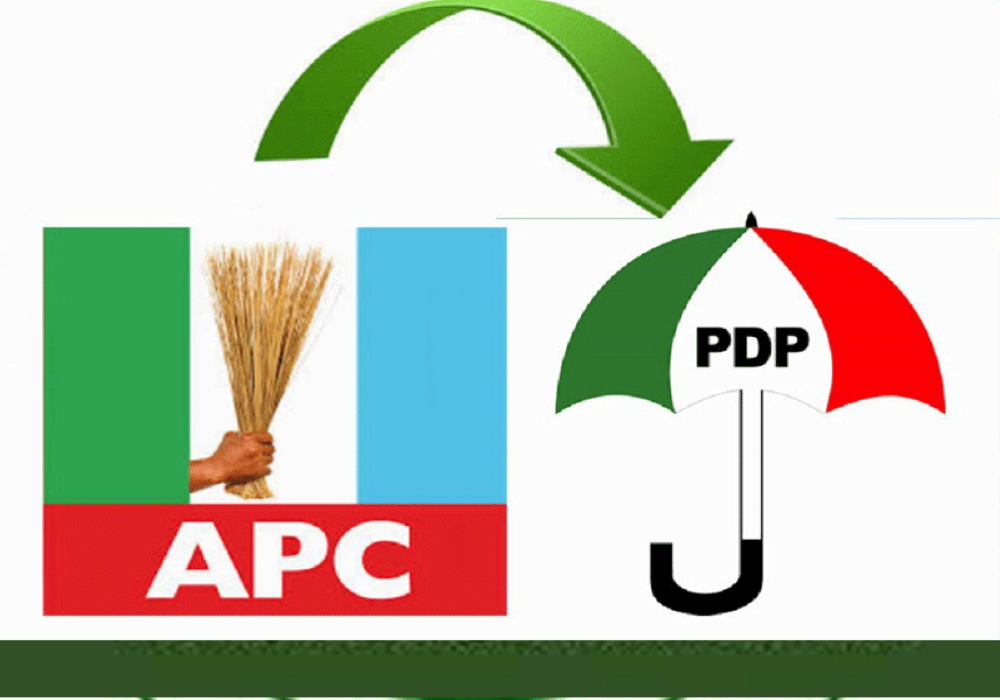
Fred Itua
The Edo State Chapter of the Peoples Democratic Party (PDP) has become the political equivalent of a broken-down car, abandoned by its driver after years of reckless driving. It is a shadow of its former self—a factionalized, internally battered, and directionless entity that, instead of seeking redemption, has resorted to aimless wailing against a government that is steadily gaining the trust of the people.
Much like a drowning man flailing in the waters of irrelevance, the PDP is desperately grasping at anything that gives the illusion of political survival. Their latest antics, rather than winning them public sympathy, only reinforce the obvious: Edo PDP is in the Intensive Care Unit (ICU), gasping for air, and rather than battling for survival, they are wasting their dwindling oxygen on unproductive tantrums.
The PDP is not just a sick party on life support—it is a party suffering from terminal political irrelevance. The faction-ridden, scandal-infested remnants of what was once a ruling party has now been reduced to a collection of desperate voices clinging to lies, propaganda, and outright misinformation in a last-ditch effort to remain in public discourse.
It is ironic that the same party that spent the last eight years squandering the State’s resources and alienating its own members now claims to be the voice of reason. The same party that crushed its foundational members—the Legacy PDP—under the weight of impunity and godfatherism is now pretending to be champions of the people. Their newfound role as self-appointed critics of Governor Monday Okpebholo is not driven by patriotism or concern for Edo’s progress; it is nothing more than the desperate growl of a wounded lion that has lost its territory.
Former Governor Godwin Obaseki and his co-travellers were the architects of PDP’s downfall. They ran the party into the ground with their arrogance, side-lining loyal members, imposing candidates, and rewarding opportunists who saw governance as a personal business empire. Now that they have been rejected at the polls and abandoned by the people, their remaining foot soldiers—men like Ogbeide Faluyi Isibor and Chris Nehikhare—have adopted an attack-dog strategy, barking at every single move of the Okpebholo-led Government.
A glaring example of this political misadventure is Chris Nehikhare, a man whose legacy is tainted with corruption, deceit, and an unquenchable thirst for misleading the public. This is the same man who openly admitted to purchasing a government-owned Prado SUV worth N200 million for a laughable N750,000—daylight robbery that epitomizes the reckless looting culture of the PDP era. And yet, with a straight face, he wants to lecture the good people of Edo on accountability and governance. The irony is staggering.
Take, for example, their fabricated outrage over recent security incidents in Ovia and Okpekpe. While the Okpebholo administration swiftly mobilized security forces and initiated immediate responses to curb the threats, PDP shamelessly tried to spin the situation to cover up their own failures. Under their disastrous leadership, Edo’s security architecture collapsed, leaving citizens at the mercy of criminals. Yet, here they are, pretending to care about security only because it offers them another excuse to criticize.
The difference is clear: PDP ignored insecurity for eight years, while Governor Okpebholo has already taken decisive actions, equipping security agencies and restructuring the Edo Security Network. That is the kind of leadership Edo people recognize and respect—not empty rhetoric from disgruntled PDP loyalists who have lost their political feeding bottle.
The PDP’s obsession with baseless accusations extends to their laughable claim that the Okpebholo administration is “inducing” members of the Edo State House of Assembly with ₦200 million each to defect to the APC. This is not only a falsehood; it is a tragic reflection of PDP’s own corrupt mind-set. In their time, they could only buy loyalty with cash because they lacked any real governance achievements to inspire followership. But today, APC is the new bride in Edo, not because of bribery, but because of the people-centred leadership of Governor Okpebholo.
Take Hon. Sunday Ojiezele Ikpenomen, for example. This was a staunch PDP lawmaker who willingly defected to the APC—not because of money, but because he saw the unprecedented developmental strides of the new administration. PDP should stop assuming that every politician shares their old-fashioned, corruption-ridden mentality. Instead, they should focus on fixing their own internal disaster before pointing fingers at a government that is already delivering results.
But here’s the part that baffles the people of Edo: how does a party that wasted eight years of golden opportunity suddenly find the moral audacity to question a government that is barely a few months old?
Governor Monday Okpebholo is not a man of empty words and flamboyant speeches—he is a leader of action. He does not waste time on grandiose promises; instead, he gets to work on real, practical governance. One of his first major projects—the construction of the Rahmat Park Flyover—was welcomed by Edo residents as a long-overdue development. But, as expected, PDP, in its usual tone-deafness, raised a needless alarm, questioning the necessity of the project. The irony is not lost on anyone: this is the same party that promised industrial hubs and economic rejuvenation, only to leave behind white elephant projects that served no real purpose other than enriching a few consultants.
Perhaps the PDP should take a moment to reflect on its own failures before attacking the new government. What became of all the so-called innovation hubs that Obaseki loudly inaugurated? Where are the jobs he promised Edo youths? What happened to the billions allocated for infrastructure that never materialized? Instead of addressing their abysmal record, PDP’s remnants prefer to sit on the side-lines and scream at a government that is busy fixing their mess.
Their latest tactic—flooding the media space with baseless allegations—only proves one thing: they are still reeling from their disgraceful electoral defeat. Having failed to produce any credible argument at the Edo State Election Petition Tribunal, their last resort is to cry foul at every policy of the Okpebholo administration.
But here’s where they miss the point: Edo people are not fooled. They have seen the difference between rhetoric and practical governance. They are witnessing first-hand the commitment of a government that listens, engages, and acts. While PDP’s new poster boys are busy playing opposition for the sake of opposition, Governor Okpebholo is rolling up his sleeves and delivering results.
Governor Monday Okpebholo is not just leading a government; he is leading a rescue mission to recover Edo from the abyss PDP pushed it into. Under PDP, Edo was seen as a State trapped in the hands of political Pharaohs, suffocating under bad governance. But Edo people have now declared they will never go back to Egypt. They have rejected the PDP’s culture of deceit, corruption, and stagnation.
No amount of lies, misinformation, or media outbursts will change the reality: the PDP is politically dead in Edo State. If Chris Nehikhare and his cohorts are so desperate to stay relevant, they should consider writing fiction novels instead of embarrassing themselves with propaganda that even their own party members do not believe.
Make no mistake, Governor Okpebholo welcomes criticism. He has openly stated that even the newly revitalized Edo Broadcasting Service (EBS) should not hesitate to call him out where necessary. But criticism should be based on facts and logic, not bitterness and political frustration. The PDP’s rants are not about governance; they are about wounded egos and lost political privileges.
Edo people have moved on. The future is in the hands of a leadership that prioritizes practical development over political games. The PDP, if it still hopes to be relevant, should abandon its ICU-induced rants and start doing the hard work of genuine opposition—one that offers constructive alternatives rather than desperate, uncoordinated attacks.
Until then, their cries will remain what they are: the last gasps of a party in political coma, struggling to find its place in a State that has outgrown its failures.
Itua, the Chief Press Secretary to the Edo State Governor, wrote from Benin City
Opinion/Feature
Okpebholo’s Unshaken Drive To Recover Edo’s Stolen Assets
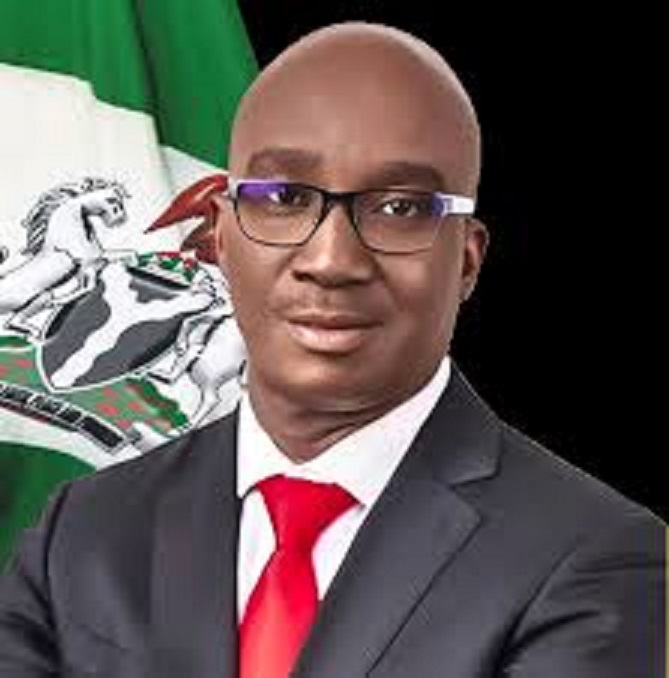
By Fred Itua
Wednesday, February 5th, 2025, could best be described as a day of gloom in Edo State, and indeed, our country, Nigeria! It turned out a black Wednesday as mind blogging, heart rending, and unbelievable revelations were brought to light.
Gloomy enough to declare for a state wide mourning, with all residents dressed in sack-cloths, covered in ashes as they mourned the depth of plundering, mind-bogging looting, heartless shady deals, lack of transparency and institutionalisation of corruption by the Godwin Obaseki led administration.
While many often taunted the immediate past administration of Obaseki as an MoU government, known only for rhetorics and no action, not many (if any) would have envisaged or imagined the level of fraud and corruption that took place under his watch as governor of Edo State.
READ ALSO: Adeleke Engages 10,000 Youths For Imole Youth Corps
Submitting its findings contained in 3,900 pages to the incumbent Governor of Edo State, Senator Monday Okpebholo, the Edo State Assets Verification Committee, a body set up on the 26th November, 2024 to assess government’s assets and liabilities, unveiled a can of worms and shady dealings perpetrated by former Gov Obaseki and his cronies that would make any conscientious citizens cringe in holy indignation.
From the reports, one thing became glaring and obvious – Obaseki ran Edo State like a mafia, and his mission resonates with the first part of John 10:10; “to steal, to kill and to destroy”, and that, he did.
Like a ravaging demon, he embarked on a plundering spree, and today, the state bleeds from his satanic kind of looting.
With over 900% increase in the official debt profile of the state (from N84b in November, 2016 to N682b in November, 2024), Obaseki, a self-proclaimed financial expert and economist, made rubbish of his profession with his clear lack of financial discipline, and outrageous financial dealings.
What is even more outrageous and annoying, is the fact that, these monies were borrowed only to be redirected into the pockets of his friends and allies in the name of consultancy, shady deals and inflated projects whose procurement processes were shrouded in secrecy.
His personal company, Afriinvest, and that of his godson, Asue Ighodalo, played prominent roles in this demonic order.
In an unprecedented and very worrisome manner, State funds were used to build structures and infrastructure and handed over to private individuals/companies with no record of financial commitments.
For example, after committing N19b of Edo State taxpayers money in constructing Radisson Hotel, Obaseki’s administration ceded away 80% of the ownership to Tribury House Ltd, a private company registered in 2024 with no single financial commitment to the project.
Within December 2022 and July 2025, Obaseki’s government paid N967 million as consultancy fees to Tanit Engineering to supervise work at the Stella Obasanjo Hospital. Yes, you heard right! N967 million not for the project itself or to purchase equipment but just to supervise work at the hospital. Even more chilling is the revelation that the procurement process in this bid was restricted to only one company – Tanit Engineering…. Who owes Tanit Engineering?
EdoBEST program, which many have now nicknamed, “EdoSCAM” was not spared in this looting spree, as the heartless, looting “general” disguised as an investment banker and technocrat serially raped the state educational sector blind, while gloating in self-deceit as he continually reeled out superfluous claims to the general public. Like one drunk in his own deception and foolishness, Obaseki embezzled the funds meant for EdoBEST, while our children and teachers suffered in harsh learning conditions.
The chilling discovery that Obaseki only remitted $5m out of the $75m released by the World Bank for basic education reforms and renovation of schools to SUBEB is not only nauseating but outright wickedness. Withholding a whopping 93% of funds meant for Edo pupils and students, Obaseki demonstrated an unusual high level of lack of empathy for the Edo child.
It is disheartening that the same man that swore on oath to protect the vulnerable Edo child stole and took that which belonged to the same child.
Time and space would fail me to talk about the many atrocities of the Obaseki-led administration as revealed in the 3,900-page committee’s report.
Is it the dirty racketeering at the demolished iconic Central Hospital valued at N5b, which now houses a private museum whose ownership is shrouded in secrecy despite Edo State Government providing all the funding? Or the road contracts in which kilometers of roads were inflated and contractors paid huge sum of money, negating the procurement laws of the state?
Three months after leaving office, the Edo State Civil servants still develop goosebumps at the mention of the name, “Obaseki”! Using a consultancy firm, Greenfield to run their duties, the civil service was made redundant as “consultants” with no proven track record or work experience, had a field day, running the service as they deem fit. The result of which saw the grounding of the Nigerian Observer, Edo Broadcasting Service, Edo line, and many others.
The circle of corruption continues unabated in Nigeria because there are no consequences for people’s actions and inactions. Many times, those who have taken advantage of their leadership position to steal and abuse offices are given a pat on the back and asked to steal no more. Those who dare to call them out are asked to focus on their own and let bygones be bygones.
In this regard, Edo people sincerely are glad that Governor Monday Okpebholo had the courage and guts to order a probe into the dealings of his predecessor. It is the way to go if sanity must be restored in our public offices. These findings (the report of the asset committee) should be made public so the average Edo citizen sees the extent to which Obaseki raped and defrauded them.
Also, the relevant authorities must step in and carry out a thorough investigation and prosecution. Gone are the days when committee reports are seen merely as academic exercise. This one must and will be different.
Obaseki must unveil the identity of these shady companies he used as cronies, and the balance of $70 million World Bank funds meant for Edo schools must be released. With the volume of revelations contained in the committee’s report, we might just have in our hands a level of looting that would make the notorious Abacha’s looting appear a child’s play.
Obaseki has bitten too much! He has eaten sour grapes, and his teeth must be set on edge. Never again should our children and generations yet unborn suffer because of the uncanny greed and heartlessness of any man.
Itua, the Chief Press Secretary to Edo State Governor, wrote from Benin City, Edo State

